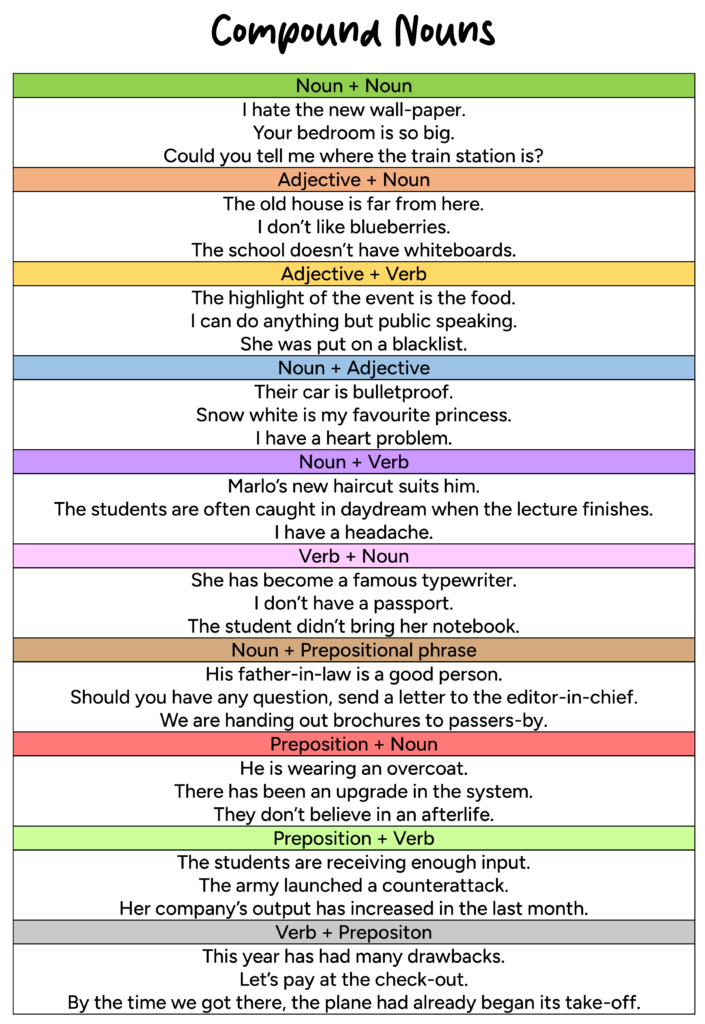What are proper nouns?
1-Proper nouns refer to a specific person, place, organization, institution, period, fictional characters, rivers, mountains, countries, days of the week, months. You need to capitalize proper nouns.
Alison, Mexico, Paris, United Nations, Renaissance, Amazon River, Mount Fuji, Sunday, November.
What are common nouns?
2-Common nouns refer to general items and things. They do not need to be capitalized (you only capitalize them if they come at the beginning of a sentence).
Flower, house, students, computer, shoe, movie, girls, art, cat, soccer.
What are concrete nouns?
3-Concrete nouns refer to things that can be touched or detected through the five senses.
Chair, notebook, bridge, tablet, pencil, bag, eyelashes, bottle, keys, napkins, wall.
What are abstract nouns?
4-Abstract nouns refer to thoughts, feelings and concepts. They cannot be touched or detected through the five senses.
Justice, wisdom, faith, creativity, joy, anger, love, information, beauty, courage, independence, confidence.
What are collective nouns?
5-Collective nouns refer to groups of people, things or animals that are considered as a single unit.
Family, group, team, army, colony, herd, jury, committee, staff.
People: a group of singers.
Animals: a herd of cattle.
Things: a fleet of ships.
Notes
1-Collective nouns can be treated as either singular or plural (depending of the meaning of the sentence).
The family is going on vocation to Sweden. ( ‘family’ is treated as singular.)
The family are arguing over the vacation plans. (‘family’ is treated as plural.)
2-If the collective noun is singular, you should use singular forms; if the collective noun is plural, then you should use plural nouns.
3-American English usually uses singular forms. British English uses plural forms.
What are countable nouns?
6-Countable nouns refer things that can be counted and have singular and plural forms. They can also be used with numbers and the indefinite articles (a / an).
One bottle = Two bottles
She has a pet shop.
We have a house in Canada, and they have three houses in Japan.
Plural countable nouns can be used alone.
He enjoys reading comics.
Cats love to play
Mirrors break easily.
Countable nouns can be used with quantifiers: some, any, many, few, a few.
Some friends are coming over for breakfast.
Do you have any pencil I can borrow?
Many birds are flying.
Few restaurants are opened.
There are only a few students at the school.
What are uncountable nouns?
7-Uncountable nouns refer to things which cannot be counted; they are always used in singular form not in plural.
Rice, butter, honey, information, knowledge, luggage, advice, furniture, clothing, money, electricity, work, wood.
I have some advices for you. Wrong
I have some advice for you. Correct
Uncountable nouns can be used with certain quantifiers: some, any, much, little.
I would like some water, please.
Do you have any butter in the fridge?
She doesn’t have much time before the meeting.
There is little information about the festival.
Countable and uncountable nouns
Coffee, paper, hair, cheese, fire, wine, memory, time, work, light.
I have gone to the company three times already.
Time flies when you’re having fun.
What are compound nouns?
8-Compound nouns refer to combinations of two or more words that function together as a single noun. They can be written in three different ways: as one word, as two separated words, as hyphenated words.
Pancake
Ice cream
Mother-in-law

Notes
1-To form the plural of a compound noun you need to add ‘-s’ or the corresponding ending to the main word.
Bedroom = Bedrooms
Heartbeat = Heartbeats
Photocopy = Photocopies
However, for two separated words and hyphenated words you pluralize the main word.
Cousin-in-law = Cousins-in-law
Washing machine = Washing machines
Ice cream = Ice creams
2-To form possessive compound nouns, you just add the apostrphe ‘s’ to the compound noun.
Her parents-in-law’s farm is pretty small.
What are possessive nouns?
9-Possessive nouns refer to possession of something or someone. The apostrophe + s is added to singular nouns and the apostrophe (‘) is added to regular plural nouns.
Sandra’s party.
The dog’s toy.
The brothers’ room.
Uses of possessive nouns
1-To describe relationships between two individuals.
Tracey’s mom.
2-To show ownership or possession of something.
Tracey’s car
3-Referring to time (temporal/time expressions).
Yesterday’s class was boring.
4-To refer to places.
Let’s grab a coffee at Tony’s.
Rules of possessive nouns
1-There are nouns that end with ‘s’, you just add the apostrophe + s.
Lucas’s tablet is broken.
2-For irregular plural nouns you add the apostrophe + s.
Men’s jeans are expensive.
Notes
1-When there are two nouns joined together, the corresponding possessive is added to the last word.
Hazel and Oliver’s parents are still working.
My brothers and sisters’ graduations are tomorrow.
To know more about nouns click here.